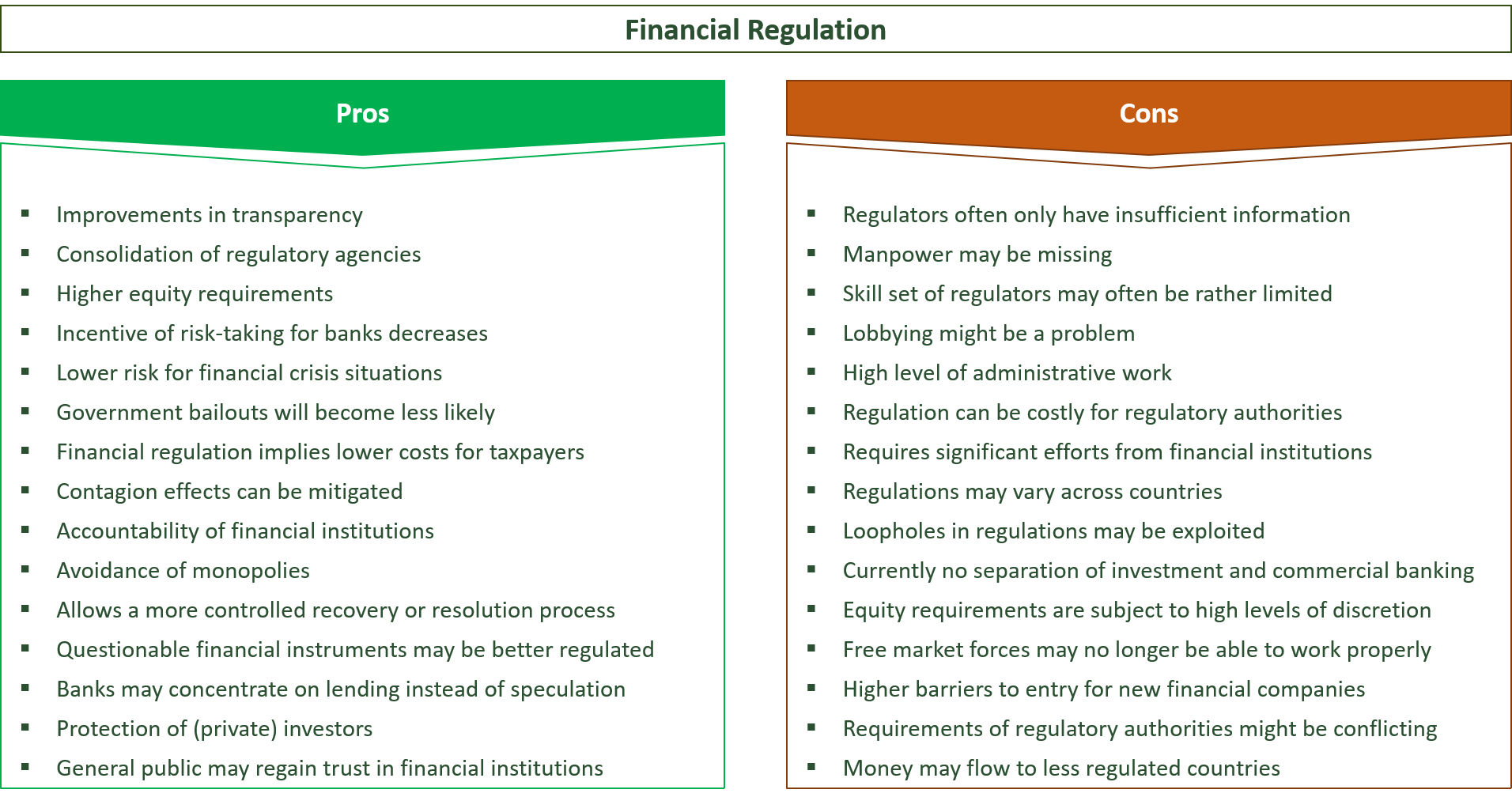” There is a very real danger that financial regulation will become a wolf in sheep’s clothing.”
Henry Paulson, Public Servant
Advantages & Disadvantages of Financial Regulation

Financial regulation is an umbrella term for the regulation of financial institutions like banks, stock exchanges or investment funds.
Due to the increasing speed of trading and the high level of interconnectedness in our global financial system, it is crucial to introduce strict laws and regulations in order to avoid excessive risk-taking of large financial corporations.
However, there are also some problems related to the regulation of financial institutions.
In this article, the pros and cons of financial regulation are examined in detail.
Audio Lesson
Contents
Advantages of Financial Regulation
- Improvements in transparency
- Consolidation of regulatory agencies
- Higher equity requirements
- Incentive of risk-taking for banks decreases
- Lower risk for financial crisis situations
- Government bailouts will become less likely
- Financial regulation implies lower costs for taxpayers
- Contagion effects can be mitigated
- Accountability of financial institutions
- Avoidance of monopolies
- Allows a more controlled recovery or resolution process
- Questionable financial instruments may be better regulated
- Banks may concentrate on lending instead of speculation
- Protection of (private) investors
- General public may regain trust in financial institutions
Improvements in transparency
One important advantage of stricter financial regulation is that it can improve the overall transparency of the financial system.
For instance, since there are much higher requirements regarding the reporting of banks, the general public as well as regulators will be much better informed regarding the equity positions of a financial institution.
Moreover, also the overall financial situation can be evaluated much better.
Therefore, the transparency level in the banking system can be vastly increased through the introduction of strict financial regulatory frameworks.
Consolidation of regulatory agencies
Through a more sophisticated regulatory system for financial institutions, there might also be a consolidation of regulatory agencies all over the world.
For instance, there might be many different regulatory agencies all over the world in each country.
However, this variety of different regulatory agencies may be quite problematic since it implies plenty of inefficiencies and also creates loopholes for financial institutions.
Therefore, sophisticated financial regulation schemes may also imply the consolidation of regulatory agencies, which may lead to a state where there are only a few global regulatory agencies left that can centrally manage the requirements for financial institutions in a consistent manner.
Higher equity requirements
Another advantage of financial regulation is that it requires banks and other financial institutions to hold a certain minimum amount of equity.
In the financial crisis in 2008, many banks had only quite limited equity positions and some of them needed bailouts in order to survive.
Thus, through stricter financial regulation, banks are forced to hold a higher minimum amount of equity and will therefore be better able to absorb losses.
Incentive of risk-taking for banks decreases
Through these higher equity positions, banks also have an incentive to lower their risk-taking strategy since they can lose more equity in case losses occur.
This also implies that banks have a bigger incentive to engage in a long-term business strategy and to avoid excessive risks.
In turn, this will also benefit the general public since the financial system will be less vulnerable and stock market swings tend to be lower.
Lower risk for financial crisis situations
Since the financial system will be less vulnerable to swings, the overall risk for the development of global financial crisis situations will also be much lower if strict regulations are in place.
A global financial crisis often occurs due to structural weaknesses in the financial sector.
With higher equity positions and better risk management practices, it is far less likely that serious financial crises manifest.
Government bailouts will become less likely
Since the risk for financial crises as well as the risk for the failure of financial institutions decreases due to the introduction of strict regulations, also the chance for the necessity of government bailouts decreases.
Since there are some financial institutions that are too big to fail, in case those institutions are in trouble, they have to be bailed out in order to protect the global financial system from collapse.
However, with higher regulatory requirements, it is less likely that those institutions will need financial help and the risk that bailouts become necessary will be much lower as well.
Financial regulation implies lower costs for taxpayers
Since the need for bailouts becomes less likely through sophisticated financial regulation, there is also a lower chance that taxpayers’ money has to be used for those bailouts.
In turn, plenty of money that would have been used for bailouts could now be used for other important infrastructural projects that will be much more beneficial for the general public.
Contagion effects can be mitigated
Contagion effects are a serious problem for our financial sector.
Since our global financial system is interconnected and a change in stock prices will affect many financial institutions at the same time, the failure of one big financial corporation may lead to the failure of many other banks.
Thus, in order to avoid those contagion effects, it is crucial to maintain strict regulatory standards.
Accountability of financial institutions
Financial regulation is also crucial to hold banks and other market participants accountable for their actions.
For instance, when a financial institution engages in risky investments, it should bear the possible losses since it also gets the financial upsides in case the investment delivers high returns.
This will give financial institutions a better sense of the level of risk they want to take and chances are that those institutions will lower their risk-taking levels if they are held accountable for their actions.
Avoidance of monopolies
Monopolies are rather harmful to customers since monopolists can charge high prices for their products and also due to various other reasons.
Also in the financial sector, monopolistic market power can lead to unhealthy developments.
Thus, in order to prevent those monopolies to form, it is crucial to limit the number of acquisitions a bank can make in order to control and confine the size and the market power of financial corporations.
Allows a more controlled recovery or resolution process
In case a financial institution suffers from periods of financial distress, there have to be processes in place on how to deal with this difficult financial situation.
For instance, in such a case, the bank can either be recovered and businesses processed will be maintained or it can be sent into resolution.
Either way, it is crucial that all the processes related to those measures will be carried out in a controlled manner in order to avoid panic in the financial system.
Questionable financial instruments may be better regulated
Some financial instruments are much riskier than others.
For instance, when you engage in market transactions of certain instruments, you can lose even more money than you initially invested and you may suffer from extreme losses due to financial market swings.
Thus, if you don’t have plenty of experience with those financial instruments, it might be better for you to stay away from such investments.
Therefore, financial regulations may also help to protect private persons with little to no knowledge to engage in these sorts of risky financial transactions in order to prevent them from unpleasant financial surprises.
Banks may concentrate on lending instead of speculation
Banks had been initially formed in order to facilitate the lending processes and to make senseful investments possible for the general public.
However, over the past decades, banks have not only engaged in lending activities, they also engaged in excessive speculation and risk-taking which will do no good for the general public most of the time.
Thus, this kind of speculation should be prohibited and financial regulators can implement certain regulations that take away the incentive for excessive risk-taking, which will in turn benefit the general public since banks will concentrate more on solid lending activities instead of speculations.
Protection of (private) investors
Another benefit of financial regulation is that it protects institutional as well as private investors from losing their money due to excessive speculations by financial institutions.
Through higher equity requirements, banks are better able to cover their losses and to pay back money to their creditors.
Thus, if you have large amounts of money on your bank account, you will be better protected due to stricter financial regulations since it will become less likely that a bank will not be able to hand back your deposits at the time you need them.
General public may regain trust in financial institutions
The trust in our financial system greatly suffered due to the global financial crisis in 2008.
Due to the excessive risk-taking of banks, large amounts of taxpayers’ money had to be spent in order to rescue those institutions.
This has led to a state where many people lost their trust in our financial system.
Therefore, in order to regain this trust, it is crucial that strict regulations are in place in order to prevent excessive risk-taking of banks in the future.

Disadvantages of Banking Regulation
- Regulators often only have insufficient information
- Manpower may be missing
- Skill set of regulators may often be rather limited
- Lobbying might be a problem
- High level of administrative work
- Regulation can be costly for regulatory authorities
- Requires significant efforts from financial institutions
- Regulations may vary across countries
- Loopholes in regulations may be exploited
- Currently no separation of investment and commercial banking
- Equity requirements are subject to high levels of discretion
- Free market forces may no longer be able to work properly
- Higher barriers to entry for new financial companies
- Requirements of regulatory authorities might be conflicting
- Money may flow to less regulated countries
Regulators often only have insufficient information
As we have seen before, there are many important advantages to financial regulation.
However, there are also some problems related to the regulation of financial institutions.
One downside of financial regulation is that regulators often have insufficient information about the processes and the politics inside a bank.
Moreover, they often don’t know the long-term strategy of those financial institutions.
This will make it quite difficult to impose appropriate measures since there will be significant differences across banks and some institutions may require much higher regulations than others.
Thus, due to insufficient information and differences across banks, financial regulation may also lead to some issues for our financial markets.
Manpower may be missing
For the supervision of banks, plenty of manpower is necessary.
For instance, there have to be controls on a regular basis and regulatory authorities have to monitor the progress of individual institutions quite carefully in order to ensure the stability of those financial institutions.
However, it may not be easy to find enough people to carry out this work that can be quite complex and demanding.
Skill set of regulators may often be rather limited
Another issue with banking regulation is that the skill set of regulators may be insufficient.
Compared to the smart people that work on Wall Street, the people who work in regulatory authorities are often just average.
However, this will lead to plenty of problems, since bankers may outsmart regulators and may be able to disguise excessive risk-taking strategies.
Thus, if the skill set of regulators is rather limited, chances are that they may be fooled by the clever people working in investment banks in the long run.
Lobbying might be a problem
Since large amounts of money are present in our financial markets, it is quite logical that banks also have many lobbyists that try to influence regulations in their favor.
For instance, if the power of lobbyists is too strong, chances are that regulations may be set in the favor of banks rather than to comply with the preferences of the general public.
High level of administrative work
The regulation of financial institutions also implies plenty of administrative work.
All controls have to be recorded and data has to be stored in a safe manner for a long period of time.
Moreover, since regulations change over time, those regulations have to be made public and banks have to adapt to those regulatory changes.
Overall, banking regulation implies significant administrative work, both for the regulatory authorities as well as for financial institutions.
Regulation can be costly for regulatory authorities
Since the monitoring and the ongoing changes in regulations require plenty of manpower, they also imply significant costs.
People who have the experience to work in this field are often quite costly and a high number of those people can add up to significant labor costs for regulatory authorities.
Requires significant efforts from financial institutions
Another problem with banking regulation is that financial institutions will often have a hard time adapting to the new requirements that are set by regulators.
Sometimes, the deadlines for implementing those regulations are quite strict and banks will have to take high levels of effort in order to comply with those regulations in time.
This may lead to a state where banks will have to spend a high fraction of their resources in order to comply with regulatory standards rather than on things that could actually move their business forward.
Regulations may vary across countries
In order to be efficient, regulations should be aligned across country borders.
Even though big banks will have to comply with strict global regulatory standards, other local institutions in exotic foreign countries may not be covered by certain regulations.
This may lead to serious problems for their customers in case of bankruptcy since those customers may lose the money on their bank accounts.
Loopholes in regulations may be exploited
Since decision-makers of big financial institutions are often quite smart, they may be able to find loopholes in regulations.
Thus, while those regulations might be set up with good intention, the outcome may be rather poor.
Therefore, the effectiveness of those regulations vastly depends on the knowledge of people who worked on it.
Currently no separation of investment and commercial banking
Another problem with our current financial regulatory framework is that there is still no separation of investment banking and commercial banking.
While commercial banking is mainly meant for solid lending activities, investment banking activities are often riskier.
Thus, it might be a good idea to separate those two fields of operation so that private persons are better protected against losses that might occur from investment banking activities.
Equity requirements are subject to high levels of discretion
There are also plenty of discussions regarding the optimal level of equity a bank should hold.
While banks usually want to hold as little equity as possible in order to increase their leverage and their return on equity, regulators often want to set higher requirements regarding the minimum amount of equity a bank has to hold in order to make our financial system more stable.
Thus, there are many discussions regarding the optimal level of equity and the equity ratios that are currently in place are also rather questionable and subject to a high level of discretion of certain interest groups.
Free market forces may no longer be able to work properly
If the level of regulation is too high, free market forces may no longer be able to work properly and firms may be quite confined in their business activities.
In the long run, this may lead to a state where some financial institutions might lose their competitiveness since the level of freedom they have might be too low to be able to compete with other institutions in the long run.
Higher barriers to entry for new financial companies
Strict financial regulations may also prevent startups to enter the market.
Investors may not be willing to provide startups in the financial sector with sufficient money since they fear those strict regulations.
In turn, the technological progress in the financial sector may be slowed down, which might hurt everyone of us in the long run.
Requirements of regulatory authorities might be conflicting
Since there are a bunch of major regulatory authorities in the financial sector right now, chances are that some requirements of one authority might not exactly be in line with the requirements of another authority.
Thus, this might lead to significant confusion since banks might no longer be able to figure out what they should do in order to comply with all requirements.
Money may flow to less regulated countries
If financial regulations become too strict, some banks may try to avoid those regulatory frameworks and shift their business operations to less regulated parts of our planet.
This may pose a danger to our global financial system since if large financial institutions will be able to settle in countries with low levels of financial regulations, they might start to engage in high risk-taking activities again, which may lead to future financial crisis situations due to the interconnectedness of our global financial system.

Top 10 Financial Regulation Pros & Cons – Summary List
| Financial Regulation Pros | Financial Regulation Cons |
|---|---|
| Transparency Improvements | Regulators may have insufficient information |
| Higher equity levels | Regulators may get outsmarted |
| Higher stability of the financial system | Significant loopholes |
| Lower risk for global financial crises | Plenty of administrative work |
| People may regain trust in banks | Financial regulation implies significant costs |
| Contagion effects can be limited | May be hard to implement by banks |
| Recovery and resolution in a controlled manner | Confinement of free market forces |
| Protection of private investors | Higher barriers to entry in the financial market |
| Savings in taxpayers’ money | Lobbying is a problem |
| Decreasing incentive for excessive risk-taking | Subject to high levels of discretion |
Conclusion
Sophisticated financial regulation is crucial in order to improve the level of stability of our global financial markets.
Although there are several benefits from those regulations, there are also some problems related to them.
Therefore, it is crucial that regulators take all the different aspects into account in order to set a valid regulatory framework for financial institutions in order to prevent financial crisis situations in the future.
Sources
https://en.wikipedia.org/wiki/Bank_regulation
https://en.wikipedia.org/wiki/Financial_regulation
https://ec.europa.eu/info/publications/financial-regulations_en
https://capital.com/financial-regulation-definition

About the author
My name is Andreas and my mission is to educate people of all ages about our environmental problems and how everyone can make a contribution to mitigate these issues.
As I went to university and got my Master’s degree in Economics, I did plenty of research in the field of Development Economics.
After finishing university, I traveled around the world. From this time on, I wanted to make a contribution to ensure a livable future for the next generations in every part of our beautiful planet.
Wanna make a contribution to save our environment? Share it!